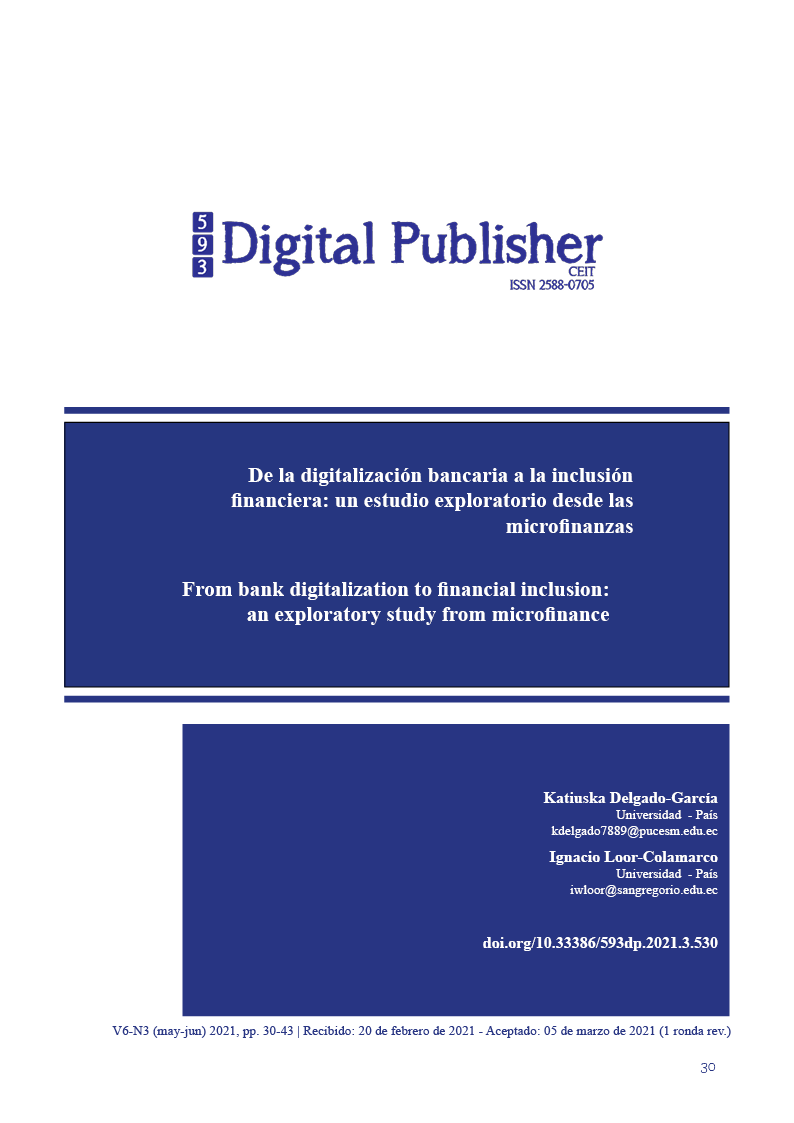From bank digitalization to financial inclusion: an exploratory study from microfinance
Main Article Content
Abstract
The study analyzes the relationship between the digitalization of financial institutions and financial inclusion in the context of microcredits in Manta, Ecuador. By using the video communication platform Zoom, the data collection involved focus groups and in-depth interviews with microcredit advisors and experts in financial digitalization. The research explores and describes a range of obstacles and opportunities to produce financial inclusion through digitalization. The emergence of the COVID-19 pandemic accelerated significantly the digitalization course of financial institutions, which includes the microcredit segments. Also, Fintech companies play an important role in promoting financial inclusion by developing applications that allow banks to approach excluded financial communities and promote transactions in these segments. Finally, to promote financial inclusion through digitalization in the rural sector, it is first necessary to bank these communities in person.
Downloads
Article Details

This work is licensed under a Creative Commons Attribution-NonCommercial-ShareAlike 4.0 International License.
1. Derechos de autor
Las obras que se publican en 593 Digital Publisher CEIT están sujetas a los siguientes términos:
1.1. 593 Digital Publisher CEIT, conserva los derechos patrimoniales (copyright) de las obras publicadas, favorece y permite la reutilización de las mismas bajo la licencia Licencia Creative Commons 4.0 de Reconocimiento-NoComercial-CompartirIgual 4.0, por lo cual se pueden copiar, usar, difundir, transmitir y exponer públicamente, siempre que:
1.1.a. Se cite la autoría y fuente original de su publicación (revista, editorial, URL).
1.1.b. No se usen para fines comerciales u onerosos.
1.1.c. Se mencione la existencia y especificaciones de esta licencia de uso.
References
Alliance for Financial Inclusion (2013). Measuring Financial Inclusion: Core Set of Financial Inclusion Indicators. Alliance for Financial Inclusion, Bangkok
Arner, D. W., Barberis, J., & Buckley, R. P. (2016). 150 years of Fintech: An evolutionary analysis. AJAF, (3), 22.
Brennen, J. S., & Kreiss, D. (2016). Digitalization. The international encyclopedia of communication theory and philosophy, 1-11.
Carballo, I. E., & Dalle-Nogare, F. (2019). Fintech e inclusión financiera: los casos de México, Chile y Perú. Revista CEA, 5(10), 11-34. https://doi.org/10.22430/24223182.1441
Center for Financial Inclusion. (2013).Seizing the moment: On the Road to Financial Inclusion. Financial Inclusion 2020 a Global Forum.
Céspedes, A., Cossio, J., Calle, S. (2018). Inclusión financiera y pobreza en Bolivia. Revista de Análisis del BCB, Banco Central de Bolivia, 29(2), 83-126
Chen, K., Long, H., Liao, L., Tu, S., & Li, T. (2020). Land use transitions and urban-rural integrated development: Theoretical framework and China’s evidence. Land Use Policy, 92, 104465.
Chun-Tie, Y., Birks, M., & Francis, K. (2019). Grounded theory research: A design framework for novice researchers. Sage Open Medicine, 7, 1–8. https://doi.org/10.1177/2050312118822927
Degryse, C. (2016). Digitalisation of the economy and its impact on labour markets. ETUI research paper-working paper.
Chun-Tie, Y., Birks, M., & Francis, K. (2019). Grounded theory research: A design framework for novice researchers. Sage Open Medicine, 7, 1–8. https://doi.org/10.1177/2050312118822927
Degryse, C. (2016). Digitalisation of the economy and its impact on labour markets. ETUI research paper-working paper.
Demirguc-Kunt, A., & Klapper, L. (2012). Measuring financial inclusion. The global findex database (Policy Research Working Paper No. WPS6025; p. 57). The world bank.
EIU (Economist Intelligence Unit), 2018; Microscopio Global 2018: El entorno para la Inclusión Financiera; Patrocinado por AfDB, Bill & Melinda Gates Foundation, Accion, BID Lab, BID Invest, Accion, and Metlife Foundation. EIU, Nueva York, NY.
Kabakova, O., & Plaksenkov, E. (2018). Analysis of factors affecting financial inclusion: Ecosystem view. Journal of Business Research, 89, 198–205. https://doi.org/10.1016/j.jbusres.2018.01.066
Kar, S., & Schuster, C. (2016). Comparative projects and the limits of choice: Ethnography and microfinance in India and Paraguay. Journal of Cultural Economy, 9(4), 347–363. https://doi.org/10.1080/17530350.2016.1180632
Kuada, J. (2019). 12—Financial Inclusion and the Sustainable Development Goals. In D. Makina (Ed.), Extending Financial Inclusion in Africa (pp. 259–277). Academic Press. https://doi.org/10.1016/B978-0-12-814164-9.00012-8
Lee, S. H., & Lee, D. W. (2016). A study on fintech based on actual cases. International Journal of u-and e-Service, Science and Technology, 9(8), 439-448.
Okello Candiya Bongomin, G., & Munene, J. C. (2020). Financial Inclusion of the Poor in Developing Economies in the Twenty-first Century: Qualitative Evidence from Rural Uganda. Journal of African Business, 21(3), 355–374. https://doi.org/10.1080/15228916.2019.1646601
Ortiz-Montes, S., & Núñez-Tabales, J. M. (2017). Inclusión Financiera: Diagnóstico de la situación en América Latina y el Caribe. Revista Galega de Economía, 26(1), 45-54.
Ozili, P. K. (2020). Contesting digital finance for the poor. Digital Policy, Regulation and Governance.
Rouse, M., & Verhoef, G. (2017). Banca móvil en el Africa Sub-Sahariana: asentando el camino hacia el desarrollo financiero.
Rubini, A. (2018). Fintech in a flash: financial technology made easy. Walter de Gruyter GmbH & Co KG.
Sarma, M. (2008). Index of financial inclusion. Indian council for research on international economic relations. http://hdl.handle.net/10419/176233
Stolterman, E., & Fors, A. C. (2004). Information technology and the good life. In Information systems research (pp. 687-692). Springer, Boston, MA.
Strauss, A., & Corbin, J. (1994). Grounded theory methodology. In Handbook of qualitative research (pp. 273–285).
Tihinen, M., Kääriäinen, J., Ailisto, H., Komi, M., Parviainen, P., Tanner, H., ... & Valtanen, K. (2016). The Industrial Internet in Finland: on route to success?
Townsend, R. M. (1995). Consumption Insurance: An Evaluation of Risk-Bearing Systems in Low-Income Economies. Journal of Economic Perspectives, 9(3), 83–102. https://doi.org/10.1257/jep.9.3.83
UNSGSA. (2020). Financial inclusion. United Nations Secretary-General’s Special Advocate for Inclusive Finance for Development. https://www.unsgsa.org/about/financial-inclusion
Venet, B. (2019). FinTech and financial inclusion. In A Research Agenda for Financial Inclusion and Microfinance. Edward Elgar Publishing.
Zavolokina, L., Dolata, M., & Schwabe, G. (2016). The FinTech phenomenon: antecedents of financial innovation perceived by the popular press. Financial Innovation, 2(1), 1-16.
Zoom Video Communications. (2020). Zoom. https://zoom.us



